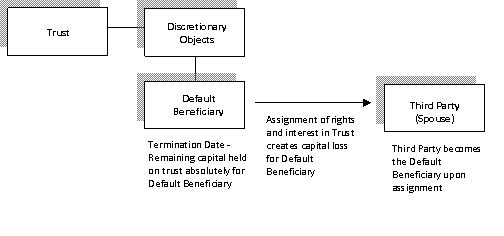Taxpayer Alert
TA 2009/14
Artificially creating capital losses through default beneficiary arrangement to offset capital gains-
The ATO view on the arrangement described in TA 2009/14 is set out in TD 2009/19.This document incorporates revisions made since original publication. View its history and amending notices, if applicable.
FOI status: may be released
|
Taxpayer Alerts are intended to be an "early warning" of significant new and emerging higher risk tax planning issues or arrangements that the Australian Taxation Office has under risk assessment, or where there are recurrences of arrangements that have been previously risk assessed. Taxpayer Alerts will provide information that is in the interests of an open tax administration to taxpayers. Taxpayer Alerts are written principally for taxpayers and their advisers and they also serve to inform tax officers of new and emerging higher risk tax planning issues. Not all potential tax planning issues that the Tax Office has under risk assessment will be the subject of a Taxpayer Alert, and some arrangements that are the subject of a Taxpayer Alert may on further examination be found not to be of concern to the Tax Office. In these latter cases the Taxpayer Alert will be withdrawn and a notification published which will be referenced to that Taxpayer Alert. Taxpayer Alerts will give the title of the issue (which may be a scheme, arrangement or particular transaction), briefly describe the issue and will highlight the features which are of concern to the Tax Office. These issues will generally require more detailed analysis to provide the Tax Office view to taxpayers. Taxpayers who have entered into or are contemplating entering into an arrangement similar to that described in this Taxpayer Alert might obtain their own advice or contact the Tax Office to seek guidance in relation to the superannuation regulatory issues covered in the Taxpayer Alert. This Taxpayer Alert is issued under the authority of the Commissioner. |
This Taxpayer Alert describes arrangements where a taxpayer with a current or future capital gain attempts to artificially create an offsetting capital loss by becoming a default beneficiary for a discretionary trust (for no consideration) and then transferring their interest in that trust (for no consideration).
DESCRIPTION
The alert applies to arrangements having features that are substantially equivalent to the following:
- 1.
- A trust is established for the benefit of discretionary objects.
- 2.
- The deed for that trust confers discretionary powers of appointment of income and capital on the trustee or a third party appointor.
- 3.
- The trust has a named default beneficiary who on the termination date will take any trust capital that has not been appointed.
- 4.
- The default beneficiary may also be one of the discretionary objects.
- 5.
- The default beneficiary does not give any money or property to acquire the interest in the trust capital.
- 6.
- The default beneficiary assigns all their interests (default and discretionary interests) in the trust to a third party (for example, a spouse).
- 7.
- The assignment of rights to trust capital is said to produce entitlement to a capital loss for the default beneficiary (under CGT event E8).
- 8.
- The basic features of the arrangement can be summarised diagrammatically as follows:

Features which concern us
The Tax Office considers that the arrangement outlined above gives rise to taxation issues which includes whether:
- (i)
- a valid trust has been created at general law;
- (ii)
- any subsequent purported assignment is valid at general law;
- (iii)
- the assignment of a default interest in the capital of a trust will result in either CGT event E8 or CGT event A1 happening to the holder of the interest and the calculations associated with such an event;
- (iv)
- a default interest in the capital of a trust constitutes an 'interest in the trust capital' for the purposes of CGT event E8 and the appropriate valuation of such an interest;
- (v)
- the arrangement may constitute a scheme to which the general anti-avoidance rules in Part IVA of the Income Tax Assessment Act 1936 (ITAA 1936) may be applied to cancel a relevant tax benefit; and
- (vi)
- any entity involved in the arrangement may be a promoter of a tax exploitation scheme for the purposes of Division 290 of Schedule 1 to the Taxation Administration Act 1953.
Indeed we have seen cases where there appears to have been backdating of the documents, and we are considering criminal prosecution action.
The Australian Taxation Office is currently reviewing these arrangements.
Amendment history
| Date of amendment | Comment |
|---|---|
| 3 May 2024 | Updated Tax Agent tip off hotline number |
| 19 January 2024 | Updated ATO tip-off hotline numbers |
Date of Issue: 21 May 2009
Date of Effect: 21 May 2009
Related Practice Statements:
PS LA 2008/15
Subject References:
Trusts
Taker In default
Default interest
Assignment of interest
Capital Gains Tax
Legislative References:
Income Tax Assessment Act 1936
Part IVA
Income Tax Assessment Act 1997
Div 104
Taxation Administration Act 1953
Schedule 1 Div 290
Stephanie Martin
Deputy Commissioner
| Contact Officer: | Bruce Collins |
| Business Line: | Aggressive Tax Planning |
| Section: | Technical & Case Leadership |
| Phone: | (02) 6216 2710 |
| Date: | Version: | |
| 21 May 2009 | Original alert | |
| 19 January 2024 | Updated alert | |
| You are here | 3 May 2024 | Updated alert |
Copyright notice
© Australian Taxation Office for the Commonwealth of Australia
You are free to copy, adapt, modify, transmit and distribute material on this website as you wish (but not in any way that suggests the ATO or the Commonwealth endorses you or any of your services or products).
